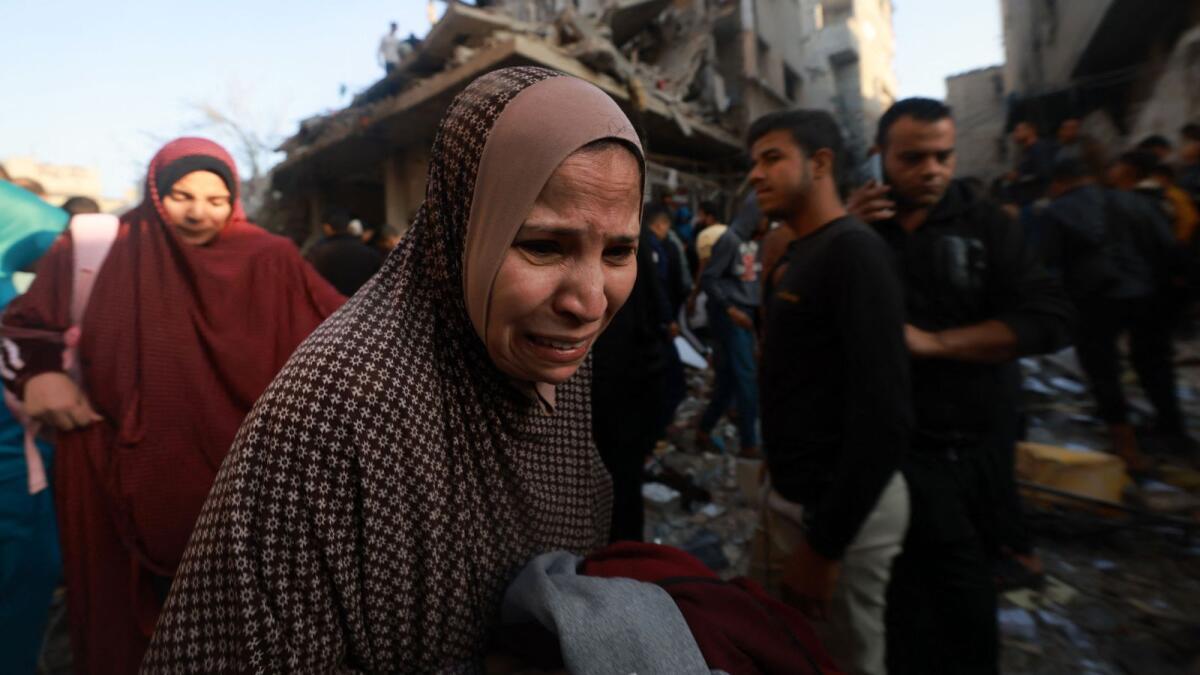
'To Restore Lost Dreams In Gaza': Palestinian Man Hopes UAE Zayed Prize Can Help Rebuild His War-Torn Homeland
Last updated: Sat 2 Dec 2023, 11:06 AM
Palestinian national Ahmed Sourani was happy to have been named among the winners of this year's Zayed Sustanability Prize - but even with this life-changing grant, he couldn't shake the devastating Gaza situation off his mind.
"I am constantly thinking about my country, my people, and the situation in Palestine, especially Gaza. This occupies my thoughts and concerns constantly, deeply rooted in my heart and mind,” Sourani told Khaleej Times after the awarding ceremony held on Friday evening as part of the ongoing COP28 at Expo City Dubai.
Stay up to date with the latest news. Follow KT on WhatsApp Channels.
He won the food category of the $5 Zayed Sustainability Prize. Ten other winners were awarded under the other categories, which included health, energy, water, climate action, and global high schools.
Since its launch in 2013, Sourani's organisation Gaza Urban and Peri-urban Agricultural Platform (Gupap) has improved food access to approximately 7,100 individuals and raised the income of 200 women agripreneurs in his country.
His non-profit organisation also supported the production of 18 tonnes of local agricultural products.
Empowering Gaza's women, rebuilding lives destroyed by warWith the prize, Sourani vows to support Palestinian women whose small and micro-enterprises have been affected by the Gaza crisis.
“We aim to assist them in restarting or shifting production and empowering them again," he said.
"Additionally, we'll help other women build their skills and organise locally to produce and distribute food, especially to vulnerable families, families in shelters who have been severely affected by the war."
AFPHolding his award, Sourani hoped the recognition could lead to more partnerships and projects that could help Gazans dream again and live with dignity.
Urgent action from the international community is needed to rebuild the devastated Gaza Strip, he said.
“This (award) will hopefully pave the way for more collaboration and development, which will help our community and restore the lost hope and dreams," Sourani said. "(I hope it can create) a better future where people can live with dignity and their rights respected."
To strengthen its commitment to promoting sustainable and humanitarian development, the Zayed Sustainability Prize will be increasing its endowment, from $3.6 million to $5.9 million, effective immediately.
Solar dryer to solve farmers' problems in NigeriaUnder the Global High School category in the 'Sub-Saharan Africa' segment, a 15-member team of students won the Zayed sustainability award for a solar dryer concept that can help increase community farmers' ioncome and prevent post-harvest losses.
Explaining the vision, Mohammed Nouri Ibrahim, the supervising instructor of the project at Gwani Ibrahim Dan Hajja Academy, said:“Once this dryer is developed, 300 students and 50 teachers will be trained as solar green ambassadors to pass on this knowledge and impact 13,000 smallholder farmers and 200,000 community members."
The idea was born out of a need to solve the persistent harvest problems in Nigeria.
“This is due to the unstable power supply and lack of farmers' knowledge to sell their harvest to the markets. It is an initiative by the students since we have plenty of solar power in Nigeria and we want to create a dryer that will dry perishable goods, like tomatoes and various types of peppers," Ibrahim said.
"After developing the dryer, we will make sure that we draw the attention of farmers to how this technology will make their lives easier,” the 34-year-old teacher added.
UK students create sustainable productsAnother group of students, who are from the Northfleet Technology College in the UK, have set up a student-led ethical entrepreneurship programme. And among their projects is an apiary (beehive farm) at a nature reserve, which produces honey and wax for creating sustainable products.
One of the student representatives of the winning team, James May, explained that the income from the sustainable products will be reinvested in the community.
"We have two beehives on our site. We call the site the nature reserve. The area in our school was once misused and we've renovated it. We have planted trees and introduced wildlife and different flora and fauna. With the two beehives, we then use the honey and the wax produced by them to create products. This is where entrepreneurship comes in," May said.
These students then sell the products to the local community or online, and the profits go back into the project.
“With community involvement, and education, we try and bring in as many local primary and secondary schools or the local community groups and educate them about biodiversity and how they can produce their own crops and food,” said another team member, Callum Ferguson.
ALSO READ:
- UAE: Palestinian baby Emarat among first newborns on National Day
- 'Magnitude of catastrophe is unimaginable': Call for ceasefire in Gaza heightens
- UAE President honours 11 winners of Zayed Sustainability Prize at COP28
- COP28 in Dubai: Top world leaders talk of climate crisis; calls for action on fossil fuels, war

Legal Disclaimer:
MENAFN provides the
information “as is” without warranty of any kind. We do not accept
any responsibility or liability for the accuracy, content, images,
videos, licenses, completeness, legality, or reliability of the information
contained in this article. If you have any complaints or copyright
issues related to this article, kindly contact the provider above.


















Comments
No comment